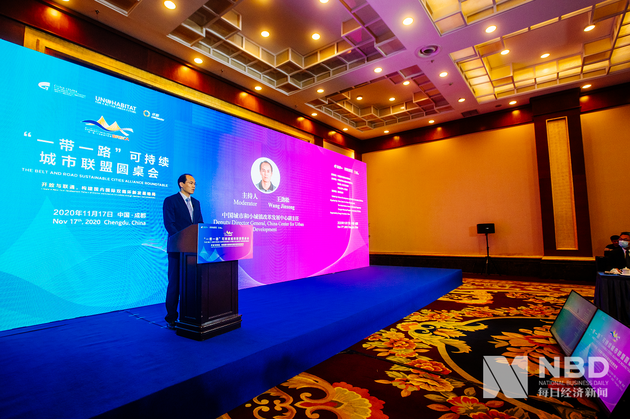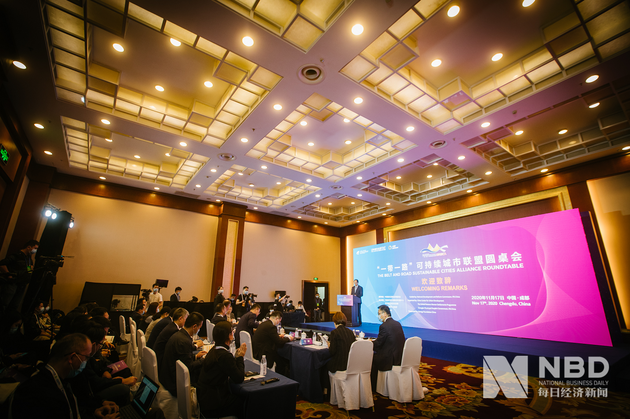
Photo/Zhang Jian (NBD)
Nov.18 (NBD) -- From November 16 to 18, the Fourth International High-level Forum on Sustainable Urban Development (the "Forum") is held in Chengdu, highlighting the latest challenges and opportunities for cities and regions across the globe with the theme of "Promoting High-Quality Sustainable Development for Open and Sharing Cities for the Future".
On November 17, as part of the ongoing forum, the Belt and Road Sustainable Cities Alliance Roundtable (the "Roundtable") convenes policymakers, urban administrators, scholars and experts to share insights on how to "Create a New Dual Development Pattern of Internal and External Circulations through Openness and Connectivity".
Roundtable to bridge intl cooperation
In the special time of this year's fight against the coronavirus pandemic, Chinese President Xi Jinping once again elaborated on how the Belt and Road Initiative ("BRI") proposed by China for the benefits of the world has contributed Chinese wisdom to the world through unity and cooperation in overcoming the hard times.
"In the context of the pandemic, how to promote sustainable development of domestic and international cities through co-building the BRI is a new topic worth profound discussions," remarked Shi Yulong, Director General of China Center for Urban Development.
In his eyes, the coronavirus pandemic has underlined the significance of jointly building the "Belt and Road" and achieving win-win results based on unblocked connections. "Facing the new situation of long-term and normalized epidemic prevention and control, we need to apply innovative thinking and convene global institutions, local governments, think tank experts and enterprises to form an cooperative chain."
According to Shi, Chengdu has announced its initiative on Livable Cities under the Belt and Road Sustainable Cities Alliance, which proposed to strengthen connections among relevant groups for experience sharing and co-creating solutions to tackle urban challenges.
Li Bin, First-class Counsel (DG-level) at Department of International Cooperation of China's National Development and Reform Commission, also stressed the importance of connectivity and partnership between countries and cities. "The unbalanced development is the biggest imbalance in the world today. We are committed to strengthening international cooperation in development and providing corresponding platforms."
"The Roundtable today aims to provide an international cooperation platform to gather consensus from all parties," Li noted.

Photo/Zhang Jian (NBD)
'Dual circulation' creates new opportunities for BRI
Ever since China's top leadership floated the new economic development pattern of "dual circulation" in May, the "dual circulation" strategy has become the buzzword for those who follow the Chinese economy.
With the policy, China places a greater focus on the internal market and sees it as a major driver of economy while maintaining foreign markets as its second engine of growth.
It's believed that the development pattern of internal and external circulations will generate great opportunities and driving force for building the "Belt and Road".
Wu Jingren, president of Research Institute of China Development Bank, explained that the "dual circulation" is by no means a closed domestic loop, and the internal and external circulations are connected in an all-round way.
When it comes to the BRI framework, the higher quality that China's internal circulation has, the more China can benefit the countries along the "Belt and Road".
At the Roundtable, guests also shared a couple of outstanding cases of promoting domestic and international circulations.
"The Southern Silk Road started from Chengdu since ancient times. The city is now deeply engaging in the building of the 'Belt and Road'," said Liu Xiaoliu, Deputy Mayor of Chengdu.
Chengdu has been implementing strategic channel construction, international innovation cooperation, international trade exchanges, international consumption, and international culture exchanges, according to Liu.
Statistics shows that Chengdu has seen more than 6,000 trips of the China-Europe freight trains, transporting goods worth around 200 billion yuan.
"It's the mission and responsibility of a city to conform to the joint construction of 'Belt and Road' and to comply with the reform of global governance system," remarked Liu, adding that Chengdu will accelerate the building of new growth engine for its high-quality development.
Email: lansuying@nbd.com.cn


 川公网安备 51019002001991号
川公网安备 51019002001991号





